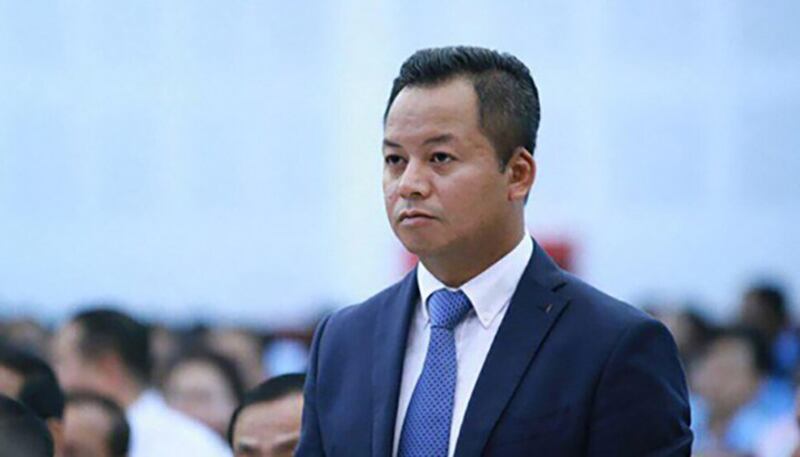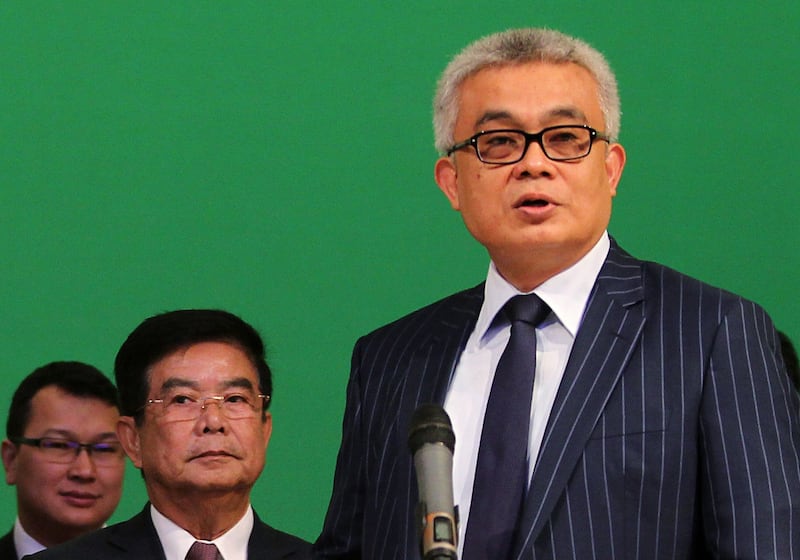Within days of the Cambodian People's Party (CPP) orchestrating a sham election last Sunday, at which it pocketed almost all parliamentary seats and consolidated its authoritarian rule, it quickly moved on to what the bogus ballot was supposed to achieve: an apparent vote of public confidence in the country's new leaders.
On Wednesday, Prime Minister Hun Sen announced that he will resign next month, after 38 years in power, and hand over the premiership to his eldest son, Hun Manet. That coronation will become official when parliament reconvenes on August 22, at which point a much wider "generational succession" will also take place. Most other aging party grandees will also resign, gifting their ministries to their children as an inheritance. According to leaked lists of nominees, almost the entire cabinet

All eyes are now on the once-in-a-generation succession that will likely see Prime Minister Hun Sen next month hand over the premiership to his eldest son, Hun Manet, while other ruling party grandees will also gift their ministries to their children as an inheritance. According to leaked lists of nominees, almost the entire cabinet will be replaced next month, mostly by the children of the current elite.
To name but a few: Hun Manet, 45, will become prime minister. Siem Reap provincial governor Tea Seiha, 43, will take over as defense minister from his father Tea Banh. Sar Sokha, 43, a ministry of education secretary of state, will inherit the interior ministry from his dad Sar Kheng.
Cham Nimol, 43, a commerce ministry secretary of state could become the next commerce minister, a position her father Cham Prasidh held for decades. The children of Sok An and Chea Sim, two late party grandees, will get into the cabinet. Supreme Court chief Dith Munthy’s son, Dith Tina, 44, is already there, made agriculture minister last year. Say Samal, 43, the son of Senate President Say Chhum, has been environment minister since 2013. For good measure, another of Hun Sen’s sons, Hun Many, 40, will become Minister for Civil Service.
Generational change
As the names and ages suggest (and that list isn’t exhaustive), this will be a sweeping generational change for Cambodia. Yet, give eye to three individuals who are neither princelings nor all that young. One of the few cabinet ministers expected to stay put is Aun Pornmoniroth, 57, the trusted finance minister since 2013. Indeed, he’s also expected to be the only deputy prime minister who will keep that post.
Back in 2020, the ruling party reportedly kicked around the idea that Pornmoniroth could be a transition prime minister, taking over from Hun Sen and ruling for a few years so that the inexperienced Hun Manet could gain some first-hand ministerial know-how. But that "Singapore Model" – so-called because that's what state founder Lee Kuan Yew handled succession in 1990 – appeared to fall out of favor, presumably because Hun Sen got his way and convinced the other party grandees that their families' wealth and patronage networks would remain intact if everyone's children rose through the ranks at the same time. Nonetheless, it at least showed that Pornmoniroth was a trusted, albeit neutral, technocrat. Indeed he is. In recent years, Pornmoniroth's finance ministry has consolidated its power over the rest of the ministries, especially when it comes to budgets. He's now the keeper of the state coffers.

Who’s set to take over as the new foreign minister? That would be Sok Chenda Sophea, 66, the head of the Council for the Development of Cambodia, a government body charged with overseeing foreign investments. So we might get an economics-minded person in the foreign ministry. A graduate of the University of Aix en Provence in France, Chenda Sophea is competent on the world stage and well-liked by international development agencies. Consider him a World Economic Forum-type of minister.
The talk in Phnom Penh is that Chenda Sophea will repivot the foreign ministry away from its focus on geopolitics, namely how Cambodia maneuvers in America and China’s New Cold War, towards a more neutral focus on simply attracting foreign investment and diversifying trade links. That, of course, means maintaining close ties with Beijing, by far the principal investor. But it also means healthier relations with the West, the main purchasers of Cambodian-made goods.
In 2017, when Cambodia's relations with the West really began to deteriorate, trade with the United States was worth $3.4 billion. It was up to $12.6 billion last year. It's well known that certain officials in the economic ministries are peeved by Hun Sen and co's constant talk about Western interference and the unwillingness to make good on claims of wanting rapprochement with the West.
Trusted officers
Last is Vongsey Vissoth, 58, currently a permanent secretary of state at the finance ministry (so Pornmoniroth's key ally) and the minister attached to the Prime Minister's office, who is tipped to become the next Minister for the Council of Ministers, effectively the cabinet organizer. For a decade, that post was dominated by the late Sok An, the so-called "minister with many arms" because of his control of so many portfolios. Vissoth could play a similar role, especially as Hun Sen's go-between with the cabinet, considering that the outgoing prime minister has no intentions of leaving politics; he'll still have a say in most issues from his position as ruling party president.
Despite their kids taking over, Hun Sen will still dictate party politics, especially over his Dauphin, while Tea Banh and Sar Kheng will watch over their sons in the defense and interior ministries, respectively. But it looks likely that this trifecta of experienced, middle-aged, economics-minded ministers will be the political managers; the trusted Chief Operating Officers to the retiring CEO’s.
![Hungary's Foreign Minister Peter Szijjarto [left] exchanges a document with Sok Chenda Sophea, secretary general of the Council for the Development of Cambodia, after a signing ceremony in Phnom Penh, Cambodia, Jan. 14, 2016. Credit: Heng Sinith/AP](https://www.rfa.org/resizer/v2/TZS6ZOFBAXEFDWFVZRI5JMX7VM.jpg?auth=d3651a0abad961ba1f672f7bb03c4b542656fc7b31ac20b6972dbc3afaca46d1&width=800&height=650)
Will that create tensions? Possibly. It’s foreseeable that some of the princelings will want more independence than they’ll get. Perhaps dynastic egos will come into play. Maybe it’ll dawn on them that they’re beholden to their fathers’ patronage. But one imagines that this will be limited by the other ministries being dependent on Pornmoniroth and Vissoth (whose current job put him in charge of the government’s fiscal policies and budgets) for finances.
Expect financial prudence as a political tactic. They'll also control the provincial purse strings. The trifecta will be trusted to keep the princelings in line and the government on track, particularly if they are to steer a refocus towards growing the economy, not play-acting at geopolitics and intra-party tussles.
The new cabinet will have little wiggle room in other areas, too. The government has already laid out a rigorous masterplan (the "Pentagon Strategy") that aims to make Cambodia a high-income economy by 2050. As such, the departments know what they're supposed to be working towards regardless of whether there's a new, youthful commerce or industry minister. It'll be the trifecta's task to shepherd the new administration through this transition.
David Hutt is a research fellow at the Central European Institute of Asian Studies (CEIAS) and the Southeast Asia Columnist at the Diplomat. As a journalist, he has covered Southeast Asian politics since 2014. The views expressed here are his own and do not reflect the position of RFA.
